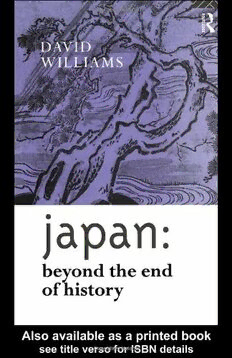
Japan: Beyond the End of History PDF
261 Pages·1993·0.817 MB·English
Most books are stored in the elastic cloud where traffic is expensive. For this reason, we have a limit on daily download.
Preview Japan: Beyond the End of History
Description:
In Japan: Beyond the End of History , David Williams examines Japan's significance, both in fact and in theory, for the Western traditions of political philosophy and practice--from Adam Smith and Hegel to the French deconstructionists and today's ''end of history'' theorists. He covers issues ranging from the industrial policy of the founders of the Meiji state to George Bush's ill-fated ''Tokyo primary'' and the birth of the Clinton presidency.The book examines Francis Fukuyama's famous argument that with the collapse of Soviet communism, the only viable system on humanity's horizon is liberal democratic capitalism in the Anglo-American mold. This suggests that East Asian mercantilism, state-led and often authoritarian, is doomed. Williams considers an alternative theory: that Japanese-style nationalist development offers a far greater challenge to Western theory and values than the fallen systems of Eastern Europe ever represented.
See more
The list of books you might like
Most books are stored in the elastic cloud where traffic is expensive. For this reason, we have a limit on daily download.
